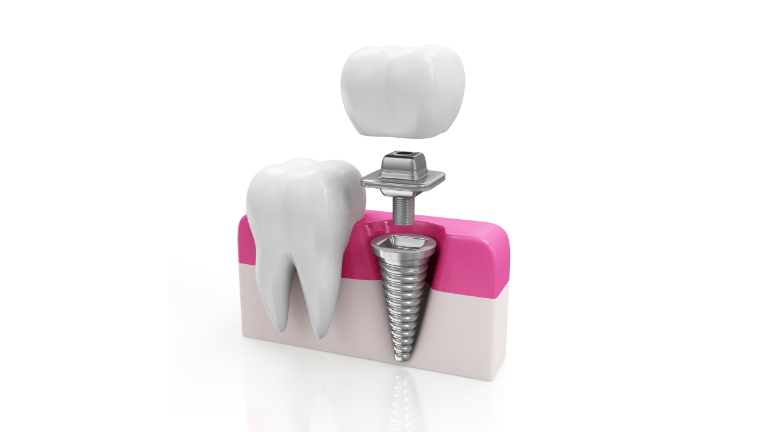Aftercare for dental implants is one of the most critical parts of ensuring your investment in a new smile pays off. While the procedure itself is a major step, what happens after surgery — especially in terms of diet and hygiene — can make or break the long-term success of your implant.
In this guide, you’ll learn how to care for your dental implants during recovery, with expert advice on oral hygiene, pain management, lifestyle precautions, and a week-by-week healing timeline.
Why Aftercare Matters for Dental Implant Success
Understanding Osseointegration
Dental implants rely on a process called osseointegration, where the titanium post fuses with your jawbone — a process that can take several weeks or months. Proper aftercare supports this critical biological function by minimizing infection risk and promoting healthy healing.
Risks of Poor Aftercare
Neglecting post-surgery care can result in:
- Infection at the implant site
- Delayed healing
- Bone loss
- Implant failure
Following your dentist’s instructions and avoiding harmful habits significantly improves the success rate of your implant.






Oral Hygiene After Implant Surgery
When to Start Brushing — and How
Avoid brushing the surgical site for the first 24 hours. After that, gently clean surrounding teeth with a soft-bristled toothbrush. Don’t scrub the implant area; instead, dab gently to avoid disturbing healing tissue.
Rinsing Protocols: Saltwater vs. Mouthwash
Use a saltwater rinse (½ teaspoon salt in warm water) 2–3 times per day starting 24 hours after surgery.
Avoid alcohol-based mouthwashes, which can irritate sensitive tissues. Only use antibacterial rinses if prescribed.
Recommended Dental Tools
- Soft-bristled toothbrush
- Water flosser (only after full healing)
- Alcohol-free, antibacterial mouth rinse (prescribed)
What to Avoid After Getting Dental Implants
Food Restrictions
Stick to soft, non-irritating foods in the first week. Avoid:
- Nuts, chips, popcorn
- Sticky or chewy candy
- Hot, spicy, or acidic foods
Lifestyle Habits: Smoking and Alcohol
Both nicotine and alcohol can delay healing and increase the risk of implant failure. Ideally, avoid them for at least two weeks post-surgery.
Activities to Avoid
- Using a straw (can disrupt clotting via suction)
- Vigorous exercise (can increase swelling or bleeding)
- Sleeping on the implant side
Managing Pain, Swelling, and Medications
What’s Normal vs. When to Worry
Mild to moderate pain, swelling, and light bleeding are normal in the first 2–3 days. Watch out for:
- Persistent or worsening pain
- Fever or chills
- Pus, foul taste or odor
Contact your dentist immediately if you experience any of these symptoms.
Pain Relief & Medications
- Use ibuprofen or acetaminophen for mild pain relief.
- Follow the full course of antibiotics if prescribed.
- Cold compresses can reduce swelling if applied within the first 48 hours (15 mins on, 15 mins off).
Healing Timeline: What to Expect Week by Week
Day 1–3: Immediate Recovery
- Rest and limit activity
- Stick to cold or lukewarm soft foods
- Follow all post-op care instructions
Week 1–2: Gum Healing
- Swelling should decrease
- Resume brushing with care
- Gradually add soft foods like mashed potatoes, oatmeal, scrambled eggs
Month 1–3: Osseointegration
- Implant fuses with jawbone
- Regular check-ups ensure proper healing
- Continue a soft diet and avoid hard chewing
Final Stage: Crown Placement
Once healing is complete, your dentist will place the permanent crown. At this point, you can begin returning to a regular diet and resume full oral care routines.
Final Tips for a Smooth Recovery
Follow-Up Visits Are Crucial
These appointments help monitor healing and make sure no issues arise. Sutures may also be removed during this period.
Long-Term Oral Hygiene Tips
- Brush twice a day with a soft-bristled brush
- Floss gently using implant-safe methods
- Schedule cleanings every 6 months
- Avoid smoking permanently if possible
When to Call Your Dentist
If your implant feels loose, you experience persistent discomfort, or swelling worsens after a few days — don’t wait. Early action prevents major complications.
Summary: What to Eat and What to Avoid
| Allowed (First 1–2 Weeks) | Avoid |
| Yogurt, mashed potatoes | Chips, nuts, popcorn |
| Scrambled eggs, oatmeal | Chewy or hard candy |
| Protein shakes (no straw) | Spicy or acidic foods |
| Applesauce, soft smoothies | Alcohol and tobacco |
Need Help with Dental Implant Aftercare in Turkey?
Our clinic specializes in medical tourism and offers full aftercare support for international patients.
Contact us now for a free consultation!


